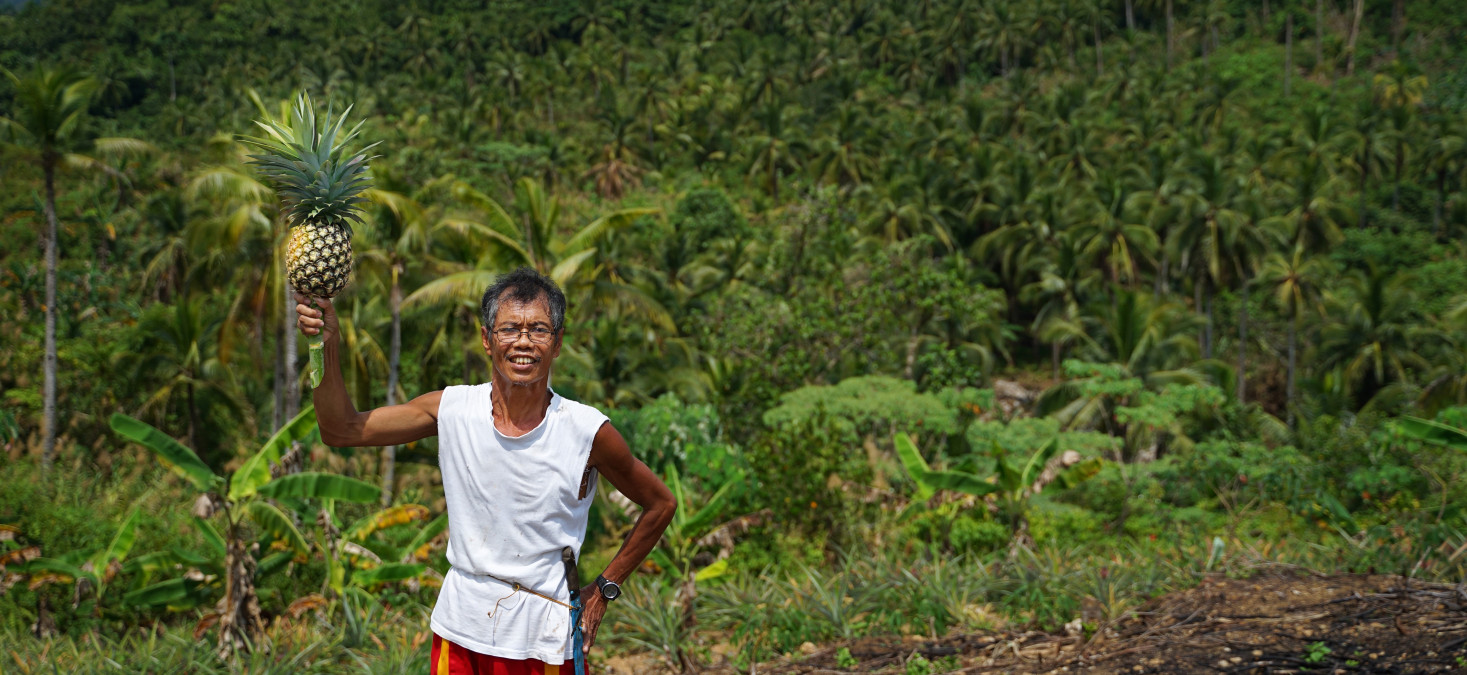Exchange visit inspires, creates opportunities for disheartened pineapple farmer in the Philippines
Published: Sep 30, 2019 Reading time: 4 minutes Share: Share an articleFor 30 years, Felipe Capones has been cultivating sweet potato, cassava, and banana in the Philippines’ Eastern Samar province. But with 11 people in his family – and six of nine children in high school – not even the supplemental income his wife makes from weeding other farms was enough to make ends meet.

So, in 2016, Felipe decided to plant pineapples. He started with 500 pineapple suckers and used the offshoots as seedlings. After three years of waiting for his plants to mature, he was able to harvest 10,000 pineapples, an impressive haul. Excited, he brought his fruit to a market in Borongan, about an hour away by boat. With a capacity of just 1,000 pineapples per boatload, it took him 10 trips to transport all of his produce. But the effort would be worth it, he assured himself, estimating that his crop would net about 40,000 pesos in revenue.
Children quit studying to support the family
If that was the end of Felipe’s story, People in Need may never have met the resourceful farmer. Unfortunately, Felipe’s income issues did not end with the sale of his new fruit.
The market in Borongan turned out to be hard on Felipe’s ambitions. Buyers offered him far less than he had anticipated. Yet, with few buyers in town, he had no choice but to accept the offer. Disheartened, he made the deal and went home with just enough money to pay off his pineapple-farming debts, which produced a cascade of other challenges. Discouraged by the family’s fiscal woes, three of Felipe’s children dropped out of school. Two of them got married, while the third took a job as a laborer to support his family.
A light at the end of the tunnel
Then, in late 2018, things began to turn around for Felipe. In October that year, Felipe’s wife participated in a training session about off-season pineapple production and management. The program, which was part of the Enhancing Sustainable Income in the Philippines (ESIP) project, was funded by Swiss Solidarity and administered by People in Need and Helvetas, an Alliance2015 partner. Impressed by what she learned she convinced her husband to sign up, too. “I was encouraged to join the succeeding trainings, where I learned new techniques on farming,” Felipe recalls.
‘Now, I harvest every year!’
After Felipe’s initial engagement with ESIP, he was invited to visit Dole’s pineapple plantation in Cotabato, where he was trained on innovative farming techniques and strategies. Through the ESIP project, Felipe also received inducers – a kind of fertilizer that allows crops to produce fruits even when it is not in season – which allowed him to harvest pineapples more frequently. This has given him leverage to increase his market price, as he has less competition during off-peak season. Best of all, it has helped him increase his yields. “I used to harvest only once in two years,” he says, “but now I harvest every year!”
Eventually, Felipe and his fellow farmers found a regular buyer who agreed to purchase their produce at fair market prices. They have even found a market for smaller pineapples, which might otherwise have been discarded as rejects. In one recent transaction, Felipe made 18,000 pesos on 3,000 pineapples, a tidy sum that would have been unthinkable before his trainings. And, because the buyer comes to him, he no longer has to pay for boat rentals and gasoline to transport his goods.
Map of Eastern Samar:
Knowledge saved Felipe’s harvest
Today, things are looking up for Felipe and his family. With the extra earnings, Felipe even managed to buy a pair of motorcycles, which come in handy for transporting his children to school in a nearby village. Although his pineapples were recently infested by pests, he was able to save his crop by using some of the techniques he learned during his tour in Dole. “Thank God I was sent to Cotabato where I learned what to do in such a case,” he says. “If I wasn’t, all my pineapples would have been infested and put to waste.”
____
The Enhancing Sustainable Income in the Philippines (ESIP) project is jointly implemented by People in Need and Helvetas and funded by Swiss Solidarity. Its goal is to increase the income and improve the resilience of poor and vulnerable farmers from Eastern Samar Province .









